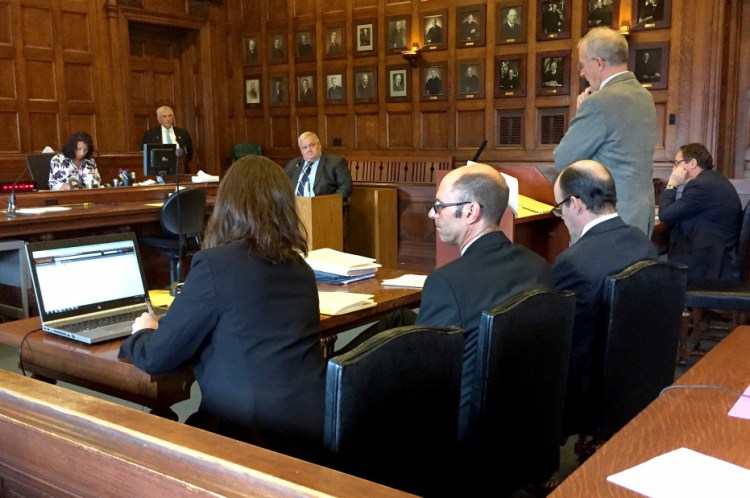Comments that a Portland landlord made the day after a fatal apartment building fire about his management of the building, the locations of smoke detectors and lease arrangements with his tenants can be used as evidence in his trial on manslaughter charges, a judge ruled Friday.
Cumberland County Superior Court Justice Thomas Warren rejected a motion by Gregory Nisbet’s attorney to suppress evidence collected by the State Fire Marshal’s Office the day after the 2014 blaze. Details of Nisbet’s conversation with Deputy Fire Investigator Daniel Young were not revealed in court and it was unclear how significant the ruling will be to the trial, which begins Monday.
“It’s not a big setback at all,” said Matthew Nichols, Nisbet’s attorney. “There’s nothing really damning in it. Most of it is tangential to the real issues in the case.”
Nisbet faces six counts of manslaughter stemming from the Nov. 1, 2014 fire, one count for each of the young people killed in the blaze that ripped through a Noyes Street apartment building. Five of the victims died inside the building, while the sixth jumped from a second-floor window and died days later as a result of severe burns.
Nisbet was not charged with causing the fire – it was determined to have been accidentally ignited by someone else’s discarded cigarette butt. But he is accused of managing the property in a way that prosecutors say led to Maine’s deadliest fire in 40 years.
He also faces six additional code violations for lack of smoke alarms, a lack of egress from a third-floor bedroom and a blocked stairwell.
Nichols asked the court to suppress statements Nisbet made to Young over the course of an hour-long conversation, without first being read his Miranda rights.
Nichols argued that Young, who already had inspected the charred remains of the duplex at 20-24 Noyes St., collected evidence about potential code violations that could lead to misdemeanor charges, which in turn could lead to manslaughter charges.
“The focus of the investigation was one person and one person only,” Nichols said.
Young, however, testified that such questioning was routine, especially in the early stages of a fire investigation.
Nichols said Friday that Nisbet agreed to speak with him and chose the time and place of the meeting, which occurred in Young’s vehicle at a nearby Burger King on Forest Avenue. At that point, Young didn’t consider Nisbet a suspect in any criminal case, he said.
Young said Nisbet declined to have their conversation recorded or provide a written statement, but he did allow Young to take notes.
Warren, the judge, said the defense presented no evidence that Nisbet was under the impression he was being interrogated or prohibited from ending the conversation. The fact that Nisbet chose the time and location of the meeting and declined to be recorded showed that he had equal control over the conversation, he said.
“Mr. Nisbet was not subjected to any physical restraint – he was free to leave,” Warren said. “The discussion at all times did not involve either aggressive or accusatory questioning by inspector Young.”
Send questions/comments to the editors.



